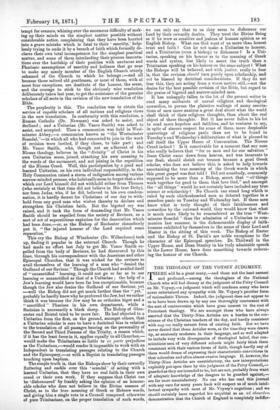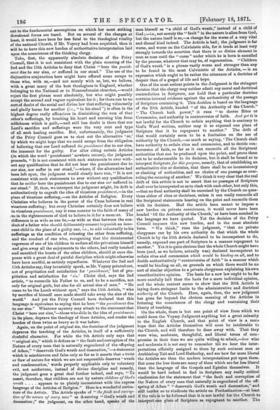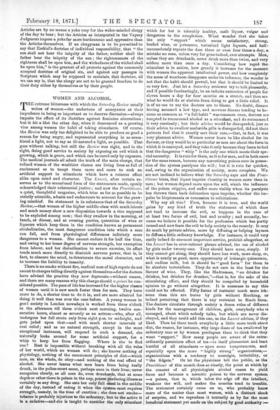THE THEOLOGY OF THE VOYSEY JUDGMENT.
THERE will be a great many,—and those not the least earnest and profound,—among the theologians of the National. Church who will feel dismay at the judgment of the Privy Council on Mr. Voysey,—a judgment which will condemn many who have never entertained any sympathy with Mr. Voysey's peculiar form. of rationalistic Theism. Indeed, the judgment does not appear to- ns to have been drawn up by any one thoroughly conversant with the sort of controversies which have gone nearest to the root of Protestant theology. We are amongst those who have always asserted that the Thirty-Nine Articles are a burden to the con- science of the Christian teachers of the day, and hardly consistent with any one really earnest form of existing faith. But we have never denied that those Articles were, at the time they were drawn up, so anxiously moderate in their language, and so well adapted to include very wide divergencies of theological belief, that con- scientious men of very different schools might fairly think them consistent with their various forms of faith, though hardly any of them would dream of expressing their characteristic convictions in that colourless and often almost evasive language. If, however, the Thirty-Nine Articles are unsatisfactory, the new interpretations explicitly put upon them by this judgment of the Privy Council,— guarded as they are intended to be, but are not, probably from want of adequate knowledge of the dangers to be guarded against,— are far more unsatisfactory. No one who has read this journal with any care for many years back will suspect us of much intel- lectual sympathy with most of Mr. Voyaey's negations ; and we should certainly have regarded his acquittal as an ad absurdum demonstration that the Church of England is completely indiffer- ent to the fundamental assumptions on which her most striking devotional forms are based. But on several of the charges at least, it would have been far less fatal to the theological vitality of the national Church, if Mr. Voysey had been acquitted, than it will be to have this new burden of authoritative interpretation laid upon the consciences of the thinking clergy.
Take, first, the apparently absolute decision of the Privy Council, that it is not consistent with the plain meaning of the 2nd and the 15th Articles to deny that Christ " bore the punish- ment due to our sins, or suffered in our stead." The use of the disjunctive conjunction here might have offered some escape to those who, with us,—and not merely with us, but, we believe, with a great many of the best theologians in England, whether belonging to the National or to Nonconformist churches,—would reject the first phrase most absolutely, but who might possibly accept the second and vaguer equivalent for it ; for there can be no sort of doubt of the social and divine law that suffering voluntarily and gladly borne for another (i.e., "in his stead") is often in the highest degree really efficacious in diminishing the sum of that other's sufferings, by touching his heart and rescuing him from selfishness which is guilt,—and still less doubt is there that our Lord's sacrifice and sufferings were the very root and type of all such healing sacrifice. But, unfortunately, the judgment of the Privy Council goes on to shut out the alternative or,' by which we might hope that we could escape from the obligation of believing that our Lord suffered the punishment due to our sins, the innocent for the guilty. For after citing certain Articles (in which the word ' punishment' nowhere occurs), the judgment proceeds, " It is not consistent with such statements to aver with- out any qualification that he did not bear the punishment due to our sins, nor suffer in our stead,"—where, if the alternative had been left open, the judgment would clearly have run, "It is not consistent with such statements to aver without any qualification that he neither bore the punishment due to our sins nor suffered in our stead." If, then, we interpret the judgment aright, its drift is authoritatively to engraft the idea of vicarious punishment,—in the place of vicarious suffering,—on the Articles of Religion. Every Christian who believes in the power of the Cross believes in real vicarious suffering ; but every Christian certainly does not believe in vicarious punishment, nay it runs counter to the faith of many of ‘us in the righteousness of God to believe in it for a moment. The difference is as wide as can be,—as wide as that between the con- duct of a father who should deliberately consent to punish an inno- cent child in the place of a guilty one, i.e., to add voluntarily to his sufferings as the condition of releasing the other from suffering, and the conduct of one who, recognizing that the disinterested eagerness of one of his children to endure all the privations himself and give away all the enjoyments to the others, had really touched and ennobled the hearts of the other children, should at once dis- pense with a great deal of painful discipline which might otherwise have been needful, as entirely superfluous. Whatever the 2nd and 15th Articles say, they invariably speak, as Mr. Voysey pointed out, not of propitiation and satisfaction for ' punishment,' but of pro- pitiation and satisfaction for 'sin.' Christ died, says the 2nd article, " to reconcile his Father to us, and to be a sacrifice, not only for original guilt, but also for all actual sins of men." " He came to be the Lamb without spot," says the 15th Article, " who by sacrifice of himself once made should take away the sins of the world." And yet the Privy Council have declared that this language is equivalent to saying that he bore "the punishment due to our sins." Whatever mystery may attach to the statement that Christ " bore our sins,"—those who slide in the idea of punishments in its place, deprave the theology of these Articles, and render the burden of them twice as heavy as it was before.
Again, on the point of original sin, the doctrine of the judgment depraves the teaching of the Articles, in itself of a sufficiently doubtful character. For while the 9th Article only says that " original sin," which it defines as " the fault and corruption of the Nature of every man that is naturally engendered of the offspring of Adam," "deserveth God's wrath and damnation,"—a statement which is mischievous and false only so far as it asserts that a twist or flaw of nature for which we are not responsible deserves ' wrath and condemnation,' words properly applicable only to voluntary evil, not misfortune, instead of divine discipline and remedy, the judgment goes a great deal further indeed, and says, "To assert, therefore, that children are not by nature children of God's :math . . . . appears to us plainly inconsistent with the express language of the Articles of Religion." Here is a wonderful carica- ture of the Article. The Article speaks of " the fault and corrup- tion of the nature of every man" as deserving " God's wrath and damnation ;" the judgment, on the other hand, speaks of the
man himself as "a child of God's wrath," instead of a child of God ;—i.e., not merely the " fault " in the nature is alien from God, but the nature itself is so,—a change for the worse of a very vital and dismal kind indeed. The Article is bad ; the judgment is far worse, and worse on the Calvinistic side, for it tends at least very strongly towards the assertion that there is no divine element in man as man until the " curse " under which he is born is annulled by the process, whatever that may be, of regeneration. " Children of God's wrath" is a phrase vastly worse and stronger than any to be found in the most Calvinistic of the Articles, — is an expression which ought to be rather the utterance of a doctrine of despair than of a gospel of life and hope.
One of the most serious points in the Judgment is the stringent decision that the clergy may neither admit any moral and doctrinal contradiction in Scripture, nor hold that a particular doctrine contains internal evidence against the authenticity of the passage of Scripture containing it. This decision is based on the language of the 20th Article, headed " of the Authority of the Church." " The Church bath power," it runs " to decree Rites or Ceremonies, and authority in controversies of faith. And yet it is not lawful for the Church to ordain anything that is contrary to God's Word written, neither may it so expound one place of Scripture that it be repugnant to another." The drift of that would certainly seem to be a limitation on the use of authority by the Church,—as much as saying, ' The Church shall have authority to ordain rites and ceremonies, and to decide con- troversies of faith, so far as it can reconcile all the Scriptural authorities that can be produced upon the point, and prove them not to be unfavourable to its decision, but it shall be bound so to interpret Scripture for this purpose, namely, that of establishing an authoritative rite or doctrine, that there shall be no inconsistency or clashing of authorities, and no choice of one passage as over- ruling the meaning of another.' We think it very clear that the real drift of this article is not to assert that no passages of Scripture shall ever be interpreted so as to clash with each other, but only this, —that no final authority shall be exercised by the Church on ques- tions either of rites or doctrines, unless it can really reconcile all the Scriptural statements bearing on the point and reconcile them with its decision. Had the article been meant to impose a new burden on private consciences, it would never have been headed ' Of the Authority of-the Church,' or have been couched in the language we have quoted. Yet the decision of the Privy Council imposes this new burden, and in the most absolute form. "We think," runs the judgment, "that no private clergyman can by his own authority do that which the whole Church is by the 20th Article declared to be incompetent to do, namely, expound one part of Scripture in a manner repugnant to another." Yet it is quite obvious that the whole Church might have been (and, as we believe, actually was) declared incompetent to ordain rites and ceremonies which would be binding on all, and to decide authoritatively "controversies of faith" in a manner which would be binding on all, on grounds on which there would be no sort of similar objection to a private clergyman explaining his own unauthoritative opinion. The basis for a new law ought to be far more carefully laid than the basis for a mere individual opinion, and the whole context seems to show that the 20th Article is laying down stringent limits to the administrative and doctrinal authority of the Church. Here, again, then, the new judgment has gone far beyond the obvious meaning of the Articles in fettering the consciences of the clergy and restraining their liberty of teaching.
On the whole, there is but one point of view from which we could deem the Voysey Judgment anything but a great calamity to the English Church, and that point of view is a mere hope that the Articles themselves will soon be intolerable to the Church, and will therefore be done away with. That they were wise, moderate, thoughtful, and liberal terms of com- promise in their time we are quite willing to admit,—how wise and moderate it is not easy to remember till we hear the inter- pretations officially assigned to them by such eminent men as Archbishop Tait and Lord Hatherley, and see how far more liberal the Articles are than the modern interpretations put upon them. But none the less there are many of them which are far less liberal than the language of the Gospels and Epistles themselves. It would be hard indeed to find in Scripture any really critical vindication for the statement that " the fault and corruption of the Nature of every man that naturally is engendered of the off- spring of Adam" "deserveth God's wrath and damnation," and still harder so to vindicate the article-on Predestination—at least if the rule is to be followed that it is not lawful for the Church to interpret one place of Scripture as repugnant to another. The
Articles are by no means a yoke easy for the wider-minded clergy of the day to bear ; but the Articles as interpreted in the Voysey Judgment impose a yoke far more burdensome and oppressive than the Articles themselves. If no clergyman is to be permitted to say that Ezekiel's doctrine of individual responsibility, that " the son shall not bear the iniquity of the father, neither shall the father bear the iniquity of the son ; the righteousneBs of the righteous shall be upon him, and the wickedness of the wicked shall be upon him," is the greatest of all protests against the commonly accepted doctrine of original sin, and against any passages in Scripture which may be supposed to maintain that doctrine, all we can say is, that the clergy are not to be granted freedom to do their duty either by themselves or by their people.




































 Previous page
Previous page